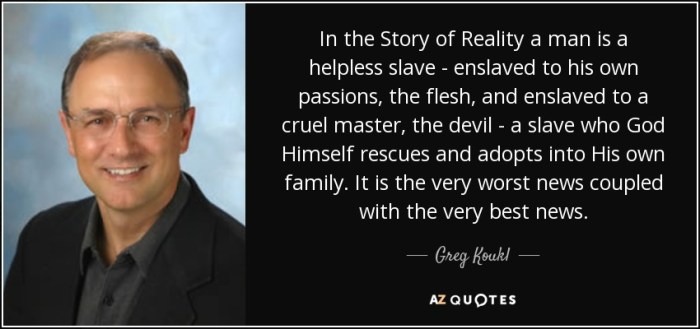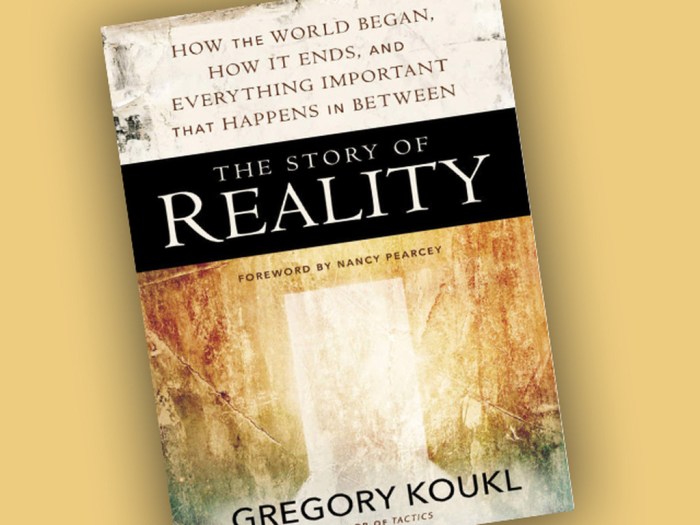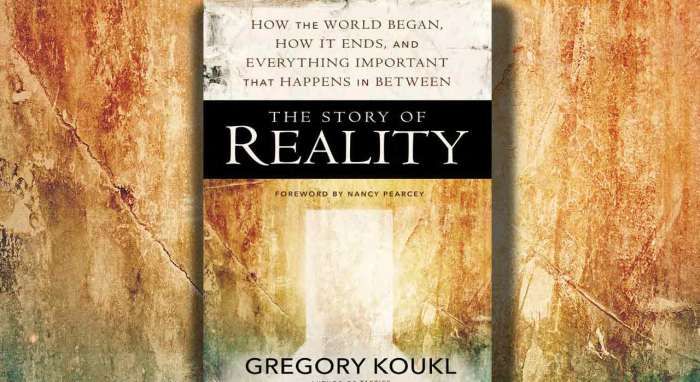Story of reality greg koukl – Greg Koukl’s Story of Reality invites us on an intellectual odyssey, exploring the foundations of our understanding of the world and our place within it. Koukl, a renowned apologist and philosopher, presents a compelling argument for the existence of God, drawing upon evidence from science, philosophy, and personal experience.
This captivating work challenges conventional notions of reality and encourages us to re-examine our beliefs. Koukl’s philosophical underpinnings, rooted in naturalism and materialism, provide a framework for his argument, inviting readers to engage with his ideas on a deeper level.
Greg Koukl’s Story of Reality

Greg Koukl’s Story of Reality is a compelling narrative that presents a comprehensive and coherent worldview based on Christian apologetics. It aims to equip individuals with a solid foundation for understanding the world and their place within it.
The Story of Reality is designed for a broad audience, including both believers and skeptics. Koukl seeks to engage readers in a thought-provoking exploration of fundamental questions about existence, purpose, and morality.
The story of reality, as told by Greg Koukl, is a fascinating exploration of the nature of truth. If you’re looking for a more lighthearted take on the topic, check out My Lucky Strike Chapter 6 . It’s a fictional story that delves into the complexities of human nature and the search for meaning in a chaotic world.
Despite its different tone, it ultimately complements Koukl’s work by highlighting the importance of questioning assumptions and seeking out the truth.
Key Themes and Concepts
The Story of Reality revolves around several key themes and concepts:
- The existence of an objective reality that is independent of human perception or beliefs.
- The nature of God as the creator and sustainer of all things.
- The inherent value and dignity of human beings as created in the image of God.
- The problem of evil and suffering in the world.
- The ultimate purpose of human existence as found in relationship with God.
Philosophical Foundations of the Story of Reality: Story Of Reality Greg Koukl
The Story of Reality is rooted in the philosophical perspectives of naturalism and materialism. These foundational ideas shape Koukl’s approach to understanding the nature of existence and his argument for the existence of God.
Naturalism holds that the natural world is the only reality and that all phenomena can be explained through scientific inquiry and empirical evidence. Koukl employs this philosophical lens to reject supernatural explanations and focus on the observable world as the basis for his argument.
Materialism
Materialism is the philosophical position that physical matter is the fundamental building block of reality. This perspective asserts that consciousness, thoughts, and emotions are products of physical processes in the brain. Koukl draws on materialism to argue that the human mind and consciousness are not separate entities but rather emergent properties of the physical brain.
Evidence for the Story of Reality

Greg Koukl presents a comprehensive range of evidence to support his Story of Reality, drawing upon science, philosophy, and personal experience.
Scientific Evidence
Koukl argues that scientific discoveries align with the Story of Reality. For instance, the Big Bang theory suggests a beginning to the universe, which aligns with the biblical account of creation. Additionally, the fine-tuning of the universe for life supports the notion of a purposeful design.
Philosophical Evidence
Koukl employs philosophical arguments to bolster his Story of Reality. He posits that the existence of objective truth, morality, and consciousness cannot be adequately explained without a transcendent reality. The cosmological argument, which infers a first cause for the universe, further supports the existence of a Creator.
Personal Experience
Koukl shares personal anecdotes and testimonies that he believes provide evidence for the Story of Reality. These include encounters with individuals who have experienced spiritual transformations or witnessed supernatural phenomena. He argues that such experiences, while subjective, can provide compelling evidence for the existence of a higher power.
Strengths of Koukl’s Evidence
- Koukl draws upon a diverse range of evidence, providing a multifaceted perspective on the Story of Reality.
- He presents scientific evidence that aligns with the biblical account, appealing to a broader audience.
- Koukl’s personal anecdotes add a relatable and emotive element to his argument.
Weaknesses of Koukl’s Evidence, Story of reality greg koukl
- Some scientific evidence presented by Koukl is subject to interpretation and ongoing debate.
- The reliance on personal experience can be criticized as anecdotal and subjective.
- Koukl’s philosophical arguments may not be persuasive to those who do not share his metaphysical assumptions.
Implications of the Story of Reality

Koukl’s Story of Reality presents a compelling challenge to conventional notions of reality, inviting us to reconsider our beliefs and assumptions. The implications of this framework are far-reaching, shaping our understanding of the world and our place within it.
Truth and Objectivity
The Story of Reality emphasizes the objective nature of truth, asserting that it exists independently of our subjective perceptions or beliefs. This challenges the postmodern notion of truth as relative and socially constructed, arguing instead that there is a universal and immutable truth that can be discovered through rational inquiry.
Purpose and Meaning
The Story of Reality provides a framework for understanding our purpose and meaning in life. By recognizing the existence of an external, objective reality, we can discern our place within it and identify the values and goals that align with our true nature.
This understanding empowers us to live lives of significance and fulfillment.
Ethics and Morality
The Story of Reality has profound implications for our ethical and moral beliefs. If truth is objective and immutable, then there are universal moral principles that guide our actions. This challenges the notion of moral relativism and provides a basis for objective ethical decision-making.
Human Dignity and Rights
The Story of Reality affirms the inherent dignity and value of every human being. By recognizing that we are created in the image of a rational and moral God, we acknowledge the equal worth and rights of all individuals, regardless of their circumstances or beliefs.
The Supernatural and the Beyond
The Story of Reality leaves open the possibility of the supernatural and the beyond. By acknowledging the limitations of our human understanding, we can remain open to the existence of realities that may not be fully comprehensible to us. This openness invites us to consider the possibility of spiritual experiences, divine intervention, and the existence of a higher power.
Criticisms of the Story of Reality
The Story of Reality, proposed by Greg Koukl, has garnered attention and sparked discussions, but it has also faced criticisms from various perspectives. These criticisms range from objections raised by atheists and skeptics to concerns expressed by adherents of other religious beliefs.
Atheist and Skeptic Criticisms
One common criticism from atheists and skeptics centers around the lack of empirical evidence to support the existence of God and the supernatural claims made in the Story of Reality. They argue that the existence of God cannot be proven through scientific methods or logical reasoning and that belief in the supernatural is based on faith rather than evidence.Another
criticism relates to the concept of truth. Skeptics question the notion of objective truth and argue that all beliefs are subjective and shaped by personal experiences and biases. They suggest that the Story of Reality is simply one of many possible narratives and that there is no way to determine which one is objectively true.
Criticisms from Other Religious Perspectives
Critics from other religious traditions may acknowledge the philosophical foundations of the Story of Reality but disagree with its specific theological claims. For example, some Christians may object to the idea that God created the universe ex nihilo (out of nothing), as they believe in the pre-existence of matter.
Others may question the concept of a personal God who interacts with the world, preferring instead a more abstract or impersonal conception of the divine.
Conclusion

The Story of Reality, as proposed by Greg Koukl, provides a comprehensive framework for understanding the world and our place within it. It is based on the idea that reality is objective, rational, and meaningful, and that it can be known through reason and evidence.
The Story of Reality has several implications for our lives. It suggests that we have a moral responsibility to live in accordance with the truth, that we should seek to understand the world around us, and that we can find meaning and purpose in our lives.
Strengths of Koukl’s Argument
- Koukl’s argument is well-reasoned and supported by evidence.
- It provides a coherent and comprehensive account of reality.
- It has practical implications for our lives.
Weaknesses of Koukl’s Argument
- Some critics argue that Koukl’s argument is too simplistic and does not account for the complexity of reality.
- Others argue that it is based on a particular worldview and is not universally applicable.
Essential FAQs
What is the main argument of the Story of Reality?
Koukl argues that the existence of God is the best explanation for the complexity and order of the universe, as well as for our own consciousness and moral intuitions.
What evidence does Koukl present to support his argument?
Koukl draws upon evidence from cosmology, biology, psychology, and personal experience, arguing that each line of evidence points to the existence of a transcendent Creator.
How does Koukl respond to criticisms of his argument?
Koukl acknowledges and addresses common objections to his argument, such as the problem of evil and the lack of scientific proof for God’s existence. He argues that these objections do not invalidate his overall thesis.